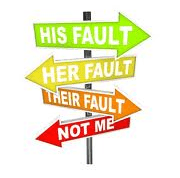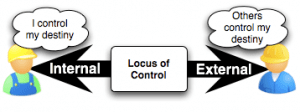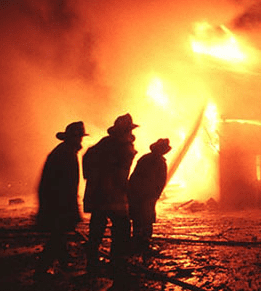 Locus of control is a psychological principal that refers to the extent to which a person feels they are in control of the events that can affect their life, well-being or success. It is often associated with how a person views what happens to them in life and who is responsible for their successes and failures. I recently came across some research on the topic of locus of control that got me wondering about the correlation it may have to first responder safety and risk taking. Let’s explore the connection.
Locus of control is a psychological principal that refers to the extent to which a person feels they are in control of the events that can affect their life, well-being or success. It is often associated with how a person views what happens to them in life and who is responsible for their successes and failures. I recently came across some research on the topic of locus of control that got me wondering about the correlation it may have to first responder safety and risk taking. Let’s explore the connection.
Locus of control
 Everyone has some belief about how much control they have over the things they encounter in life. We all know there are things for which we have no control (e.g., the weather) and things for which we have total control (e.g., the selection for your favorite cold beverage). Those are the easy ones. But what about the more difficult circumstances in life. Who controls your happiness? Who controls your income? Who controls your attitude? Clearly there are people who feel they are personally in control of everything in their lives and people who think they are in control of nothing.
Everyone has some belief about how much control they have over the things they encounter in life. We all know there are things for which we have no control (e.g., the weather) and things for which we have total control (e.g., the selection for your favorite cold beverage). Those are the easy ones. But what about the more difficult circumstances in life. Who controls your happiness? Who controls your income? Who controls your attitude? Clearly there are people who feel they are personally in control of everything in their lives and people who think they are in control of nothing.
If you feel you are in control of your situation and the things that happen to you, you are thought to have a strong internal locus of control. When you feel someone (or something else) is in control of your situation and the things that happen to you, you are thought to have a strong external locus of control. Psychologists caution that it is rare for someone to always feel completely in control or for someone to feel completely out of control. Thus, it is a continuum that we move along depending on the situation we are facing.
A first responder’s locus of control
 I would say that by the very nature of what first responders do, we inherently develop and maintain a strong internal locus of control. We are provided with a lot of training to ensure we control emergency situations and, in some instances, control the people we deal with during emergencies. In fact, the last thing a first responder wants to feel is out of control… and for good reason.
I would say that by the very nature of what first responders do, we inherently develop and maintain a strong internal locus of control. We are provided with a lot of training to ensure we control emergency situations and, in some instances, control the people we deal with during emergencies. In fact, the last thing a first responder wants to feel is out of control… and for good reason.
The first responder environment
As I noted earlier, there are things we can control and things we cannot control. This is true at emergency scenes as well. Some of the environmental factors are controllable, many are not. Our decisions can influence the control as well. If you decide to enter a high risk, high consequence, dynamically changing environment, the locus of control quickly shifts to being external. As much as we might want to think otherwise, in many respects we are no longer in control.
Competence + Confidence – Control = Trouble
![]() A well-trained first responder possesses the competence to perform high risk activities. Practicing those skills in repetition, either in training or at real incidents, builds a responder’s confidence. Those two elements – competence and confidence – help shift the locus of control to be internal (giving you the belief you are in control of the situation).
A well-trained first responder possesses the competence to perform high risk activities. Practicing those skills in repetition, either in training or at real incidents, builds a responder’s confidence. Those two elements – competence and confidence – help shift the locus of control to be internal (giving you the belief you are in control of the situation).
However, in a dynamically changing environment, control of the situation may be strongly influenced by other people (e.g., their abilities and inabilities, their decisions and indecision and their actions or inaction), as well as nature (e.g., physics, gravity, thermodynamics, propulsion, decomposition, and the list goes on and on). These external influences can quickly change who is in control. If a confident responder fails to realizes that some of the control is external, it can lead to problems.
Dr. Gasaway’s Advice
 It is critically important to remember that no matter how much training or experience we accumulate, we are only partially in control of what happens to us at emergency scenes. To improve our chances of success (and survival), it is imperative that we understand, appreciate and respect, those external factors that influence, and sometimes take away, our control.
It is critically important to remember that no matter how much training or experience we accumulate, we are only partially in control of what happens to us at emergency scenes. To improve our chances of success (and survival), it is imperative that we understand, appreciate and respect, those external factors that influence, and sometimes take away, our control.
Here’s a short list of factors (I’ll call them behaviors) every responder should strive to understand, appreciate and respect because you have so little control over them:
- Building behavior: Understanding construction and decomposition
- Fire behavior: Understanding fire growth and movement
- Smoke behavior: Understanding smoke color, volume, velocity and density
- Fuel behavior: Understanding the speed of consumption and decomposition of fuels
- Water behavior: Understanding the properties of water as a extinguishing agent
- Physical behaviors: Understanding the physics of gravity
- Weather behavior: Understanding the impact of weather, especially wind
- Human behavior: Understanding how you (and others) behave under stress
 Action Items
Action Items
1. Discuss an emergency situation where you felt you were not in control, the factors that contributed to you feeling that way and what you did to overcome the situation. Discuss the lessons learned.
2. Discuss an emergency situation where you thought you were in control, only to find out as a result of something happening, you weren’t. Discuss the consequences and the lessons learned.
3. Discuss strategies for improving your situational awareness of the behaviors listed above. Include in your discussion how you can build and maintain team situational awareness to ensure all members of your company are on the same page when it comes to the external behaviors that can impact your safety.
_____________________________________________________

If you are interested in taking your understanding of situational awareness and high-risk decision making to a higher level, check out the Situational Awareness Matters Online Academy.
CLICK HERE for details, enrollment options and pricing.
__________________________________
Share your comments on this article in the “Leave a Reply” box below. If you want to send me incident pictures, videos or have an idea you’d like me to research and write about, contact me. I really enjoy getting feedback and supportive messages from fellow first responders. It gives me the energy to work harder for you.
Thanks,

Email: Support@RichGasaway.com
Phone: 612-548-4424
SAMatters Online Academy
Facebook Fan Page: www.facebook.com/SAMatters
Twitter: @SAMatters
LinkedIn: Rich Gasaway
YouTube: SAMattersTV
iTunes: SAMatters Radio

That looks like an 8 part Fire Ground Leader course